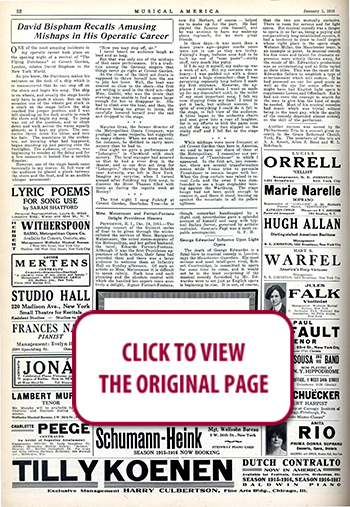 100 YEARS AGO IN MUSICAL AMERICA (125)
100 YEARS AGO IN MUSICAL AMERICA (125)
January 16, 1916
Page 32
David Bispham Recalls Amusing Mishaps in His Operatic Career
ONE of the most amusing incidents in my operatic career took place on the opening night of a revival of “The Flying Dutchman” at Covent Garden, London, relates David Bispham in the New York World.
As you know, the Dutchman makes his entrance on the deck of a ship which is so maneuvered that he can step off on the shore and begin his song. The ship is on wheels, and usually the stage hands only have to push it about. But on this occasion one of the wheels got stuck in a crack on the stage before the ship reached the proper position and I was left standing on the deck unable to reach the shore and begin my song. To jump was out of the question, and to climb down and walk across the water equally absurd; so I kept my place. The conductor threw down his bâton and tore his hair. The musicians in the orchestra, not knowing what had happened, began standing up and peering over the footlights. The audience, of course, was beginning to wonder at the delay and for a few moments it looked like a terrible disaster.
However, one of the stage hands came heroically to my rescue. In full view of the audience he placed a plank between the shore and the boat, and in an audible whisper announced:
“Now you may step off, sir.”
I never heard an audience laugh as loud and as long.
But that was only one of the mishaps of that same performance. It’s a tradition among the German singers that things never go right at Covent Garden.
At the close of the third act Senta is supposed to throw herself into the sea to join her lover. Well, the boat was moored so close to the shore—the first act setting is used in the third act—that Mme. Gadski, who was the Senta that evening, was unable to find a space large enough for her to disappear in. She had to climb over the boat, and then, the distance being too great to jump, she carefully lowered herself over the rail and dropped to the stage. * * *
Maurice Grau, the former director of the Metropolitan Opera Company, was prodigal in some respects, but niggardly in many others. When we went on tour, for instance, he disliked to carry more scenery than he had to.
One night we gave a performance of “Lohengrin” in Cleveland with stock scenery. The local manager had assured us that he had a river drop in the theater, and so our first act drop for “Lohengrin,” showing the River Scheidt near Antwerp, was left in New York. Imagine my surprise, when I turned around after finishing my first song, to discover the River Thames filled with boats as during the regatta week at Henley! * * *
The first night I sang Falstaff—Covent Garden, Beerbohm Tree—he is now Sir Herbert, of course—helped me to make up for the part. He had played the famous role himself, and he was anxious to have my make-up above reproach, for we were great friends.
In those days—it was more than a dozen years ago—papier mache noses were not in use as they are to-day. Falstaff’s huge, bulbous nose had to be built up out of “nose paste”—sticky stuff, very much like putty.
If I do say it myself, my make-up was a work of art. But my costume was so heavy—I was padded out with a dozen suits and a huge stomacher—that I was perspiring copiously long before I made my first entrance. However, the applause I received when I went on made up for my discomfort until, in the midst of my most important song, I felt my nose slipping from my face! I tried to put it back, but without success. In spite of everything I could do it fell to the stage, in full view of the audience. A titter began in the orchestra chairs and soon grew into a roar of laughter, for in my efforts to kick the paste nose out of the way my foot slipped on the sticky stuff and I fell flat on the stage floor! * * *
While mishaps were more frequent at old Covent Garden than here in America, we used to have our share of them at the Metropolitan. I remember one performance of “Tannhäuser” in which I appeared. In the first act, you remember, there are several transformation scenes while Venus tries to persuade Tannhäuser to remain longer with her. When the drop curtain was raised to reveal Leda and the swan I was dumfounded to see a huge stepladder leaning against the Wartburg. The stage hands had not been quick enough to remove it, and there it stood, leaning up against the mountain in all its yellow ugliness.




 RENT A PHOTO
RENT A PHOTO





